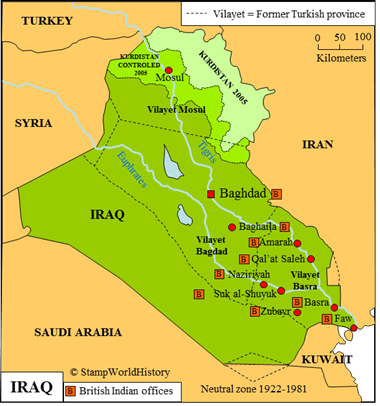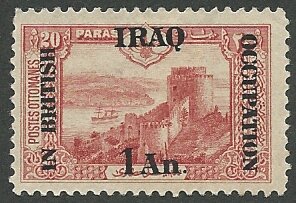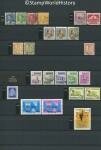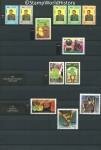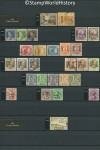العراق

Iraq
Kingdom
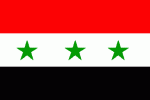
Irak
Republic
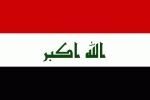
Iraq
Republic
Quick reference
General issues: British occupation 1918-1920, British mandated territory 1920-1932, Kingdom 1932-1958, Republic 1958-2003, International occupation 2003-2006, Republic 2006-Present
Country name on general issues: Iraq
Special issues: British occupation of Baghdad 1917, British Indian occupation of Mosul 1919
Currency: 1 Rupee = 16 Annas 1917-1932, 1 Dinar = 1000 Fils 1932-Present
Population: 2 890 000 in 1920, 33 420 000 in 2013
Political history Iraq
Ottoman and British rule
Iraq is located in the Middle East in western Asia. In the 19th century the largest part of Iraq is part of the Ottoman Empire forming the vilayets – provinces – of Baghdad, Basra and Mosul. When Turkey sides with Germany in WWI, British and British Indian forces invade Iraq in 1914. It will take until 1917 before the British have taken Baghdad and until 1918 before the Indian Expeditionary F0rce has taken Mosul. When, after WWI, the Ottoman Empire is divided, Iraq becomes a British mandated territory in 1920, a mandate that is formalized by the League of Nations in 1922. The former vilayet of Mosul will be occupied by the British until 1925, when Turkey relinquishes its claim on the province and it becomes part of Iraq. In 1921, under British supervision, the kingdom of Iraq is established. When the British mandate ends in 1932 the kingdom of Iraq becomes an independent state.
Independent Iraq
In the years that follow Iraq is highly unstable, between 1936 and 1941 the country goes through a coup d’etat five times. In 1941, a coup d’etat by pro German, anti British elements is reason for the British to again occupy Iraq. An occupation that will last until 1947. In 1958, the monarchy is set aside and Iraq becomes a republic. In 1968 the Sunni Ba’ath party comes to power, led by Saddam Hussein from 1979.
In its domestic policy, Iraq is confronted with opposing ethnic and religious groups. In the north – the Mosul area – Kurds strive for independence. In the rest of the country Shia and Sunni Muslims oppose each other.
In its foreign policy, Iraq declares war on Iran in 1980. On one hand, in fear of a potentially powerful Shia regime that has been established after the Iranian revolution and that is said to infiltrate in Iraq. On the other hand, territorial claims of Iraq are put forward as a motivation for the war. The war with Iran ends in 1988 with a status quo ante bellum.
The Gulf War
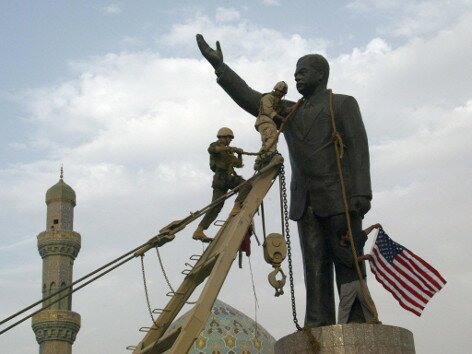
United States troops prepare to pull down a statue of Iraqi president Saddam Hussein.
In 1990, Iraq invades Kuwait. Reasons being disputes over oil resources, over the debt that Iraq has accumulated in Kuwait to fund the Iraq-Iran war, and again territorial claims by Iraq. Iraq annexes Kuwait after a short military operation. With a United Nations mandate, a large international coalition engages in the Gulf War in 1991 and frees Kuwait. After the war, economic and military sanctions are applied to Iraq. One of these being the ban of arms of mass destruction. A sanction that, in the 1990’s, will be a constant source of conflict between Iraq and the United Nations.
The Iraq War
After the attacks on the World Trade Center in New York in 2001, pressure increases on Iraq – particularly from the United States. The reason being Iraq’s alleged involvement in what is called ‘international terrorism’. Based on violations of the ban on arms of mass destruction, a coalition led by the United States – a coalition smaller than before – invades Iraq in 2003 and topples the Saddam Hussein regime. A Coalition Provisional Authority is put in place, in 2003, to govern the country, this to be followed by an Iraqi interim government in 2004 and an Iraqi provisional government in 2005, both under international supervision. Kurdistan is established as a self governing region in 2005. In 2006, general elections lead to the establishment of a constitutional government and the re-establishment of the republic of Iraq. The last coalition forces leave Iraq in 2010.
Current developments
Since 2014, Iraq is involved in the battle against Islamic State[1]IS, also called Islamic State in Iraq and the Levant – ISIL , an organization that aims to establish a Muslim caliphate and, as such, is active in Iraq, but also in Syria and an expanding number of other Muslim countries. Large parts of mainly northern and western Iraq a currently under control of IS.
Postal history Iraq
Under Ottoman rule, Turkish stamps are used in Iraq. Shortages in supply lead to a local Baghdad issue in 1890. In Iraq the British Indian postal service has opened a number of offices abroad, complementary to the British offices abroad in the western part of the Ottoman Empire – the Levant. The British Indian offices in Iraq were closed in 1914, as were most offices in the Levant.
Under British occupation, the first stamps are issued in 1917 in Baghdad: overprints on Turkish stamps reading ‘Baghdad in British occupation’. Issues for general use are issued in 1918, again overprints on Turkish stamps now reading ‘Iraq in British occupation’. In the Mosul area – not transferred to Iraq until 1925 – stamps are issued in 1919 by the occupying British Indian forces. This issue is an overprint on Turkish revenues reading ‘I.E.F. ‘D”.[2]‘Indian Expeditionary Force D’. The D indicates the division, the Indian Expeditionary Force consisted of seven divisions labeled A through G. The first definitives in the name of the kingdom of Iraq are issued in 1923. These to be followed by issues of the different forms of government the country has had to date.
Stamps inscribed ‘Iraqi Kurdistan Region’ are – although known to be used for domestic and international mail – currently not listed by the catalogs.
Album pages
← Previous page: IranNext page: Israel →

